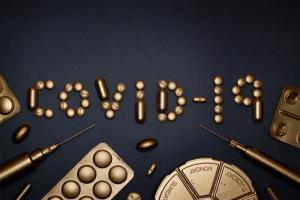The study, published in the Journal of Biological Chemistry, has shown that the jelly consists of the substance hyaluronan

This picture has been used for representational purpose only
In some patients who died of Covid-19 and respiratory failure, a jelly was formed in the lungs and now researchers have established that the active agent in the jelly can be the key to new effective therapies.
ADVERTISEMENT
"There are already therapies that either slow down the body's production of this jelly or break down the jelly through an enzyme," said study researcher Urban Hellman from Umeå University in Sweden.
"Our findings can also explain why cortisone seems to have an effect on Covid-19," Hellman added. When performing lung scans on critically ill patients with Covid-19 infection, medical professionals have been able to see white patches.
Additionally, the autopsies of some deceased Covid-19 patients have shown that the lungs were filled with a clear liquid jelly, much resembling the lungs of someone who has drowned. It was previously not known where this jelly originated from.
The study, published in the Journal of Biological Chemistry, has shown that the jelly consists of the substance hyaluronan. The presence of hyaluronan is normal in the human body, with various functions in different tissues, but it generally acts as a useful characteristic in the connective tissue.
Not least, hyaluronan is involved in the early stages of wound healing. Hyaluronan is also produced synthetically in the beauty industry for lip augmentation and anti-wrinkle treatments. Since hyaluronan can bind large amounts of water in its web of long molecules, it forms a jelly-like substance.
And it is this process that runs riot in the alveoli of Covid-19 patients' lungs resulting in the patient needing ventilator care and, in the worst case scenario, dies from respiratory failure, according to the researchers.
Currently, a drug called Hymecromone is used to slow down the production of hyaluronan in other diseases such as gallbladder attacks. There is also an enzyme that can effectively break down hyaluronan. As an example, this enzyme can be used in the event that an unsuccessful beauty treatment needs to be terminated abruptly.
Even cortisone reduces the production of hyaluronan. In a British study, preliminary data shows positive effects on treatments with the cortisone drug Dexamethasone in severely ill Covid-19 patients.
"It has previously been assumed that the promising preliminary results would be linked to the general anti-inflammatory properties of cortisone, but in addition to those beliefs, cortisone may also reduce the production of hyaluronan, which may reduce the amount of jelly in the lungs," Hellman noted.
Keep scrolling to read more news
Catch up on all the latest Crime, National, International and Hatke news here. Also download the new mid-day Android and iOS apps to get latest updates.
Mid-Day is now on Telegram. Click here to join our channel (@middayinfomedialtd) and stay updated with the latest news
This story has been sourced from a third party syndicated feed, agencies. Mid-day accepts no responsibility or liability for its dependability, trustworthiness, reliability and data of the text. Mid-day management/mid-day.com reserves the sole right to alter, delete or remove (without notice) the content in its absolute discretion for any reason whatsoever
 Subscribe today by clicking the link and stay updated with the latest news!" Click here!
Subscribe today by clicking the link and stay updated with the latest news!" Click here!







